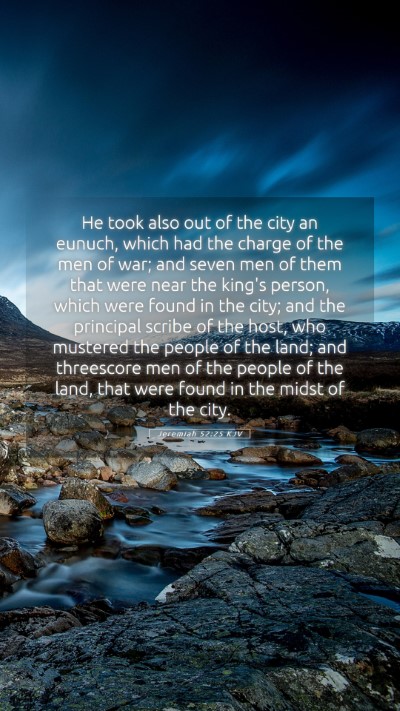Understanding Jeremiah 52:25
Jeremiah 52:25 is a profound verse that encapsulates the tumultuous times experienced by the people of Jerusalem during the Babylonian siege. It reveals the consequences of disobedience and highlights the sovereignty of God amidst human events. In this analysis, we will delve into various interpretations and explanations provided by renowned commentaries to foster a deeper understanding of this scripture.
Bible Verse:
Jeremiah 52:25 (KJV): “And he took out of the city an eunuch, which had the charge of the men of war; and seven men of them that were near the king's person, which were found in the city: and the principal scribe of the host, who mustered the people of the land; and threescore men of the people of the land, that were found in the city.”
Verse Meaning and Commentary
This verse is part of the conclusion of the book of Jeremiah, detailing the final days of Jerusalem before its fall to Babylon. The context is critical for understanding its significance. The people in charge, including certain officials and soldiers, were executed or taken captive, illustrating the complete collapse of the leadership and the authority in Jerusalem.
Insights from Public Domain Commentaries
-
Matthew Henry:
Henry notes that this verse emphasizes the severity of judgment that befell Jerusalem. The mention of specific individuals, namely the eunuch and those close to the king, signifies the prioritization of key figures in the judgment process. These events serve as a reminder of God's justice and serve as a warning to others regarding the consequences of sin and rebellion against divine authority.
-
Albert Barnes:
Barnes expands on the thought of the scribe and soldiers being taken, highlighting that these actions exemplified God’s ultimate control over human history. He suggests that their capture signifies both a physical and spiritual defeat for Jerusalem. The obliteration of their leadership also symbolizes the severance of the people from their covenant relationship with God.
-
Adam Clarke:
Clarke points out the chaotic state of Jerusalem during this time. He emphasizes that the taking of dignitaries (eunuchs, scribes, and soldiers) indicates the complete subjugation of the nation. Their roles were crucial, and their removal not only decimated the city’s power structure but also served as a harbinger of despair among the populace. Clarke offers a deep reflection on the need for divine governance, particularly in times of national crisis.
Application and Significance
Understanding Jeremiah 52:25 is essential for grasping the moral and historical lessons embedded in the narrative. The verse serves as an admonition for individuals and nations alike regarding the dire consequences of turning away from God’s commandments. In modern times, this can translate into a call for introspection and repentance within communities and leadership.
Historical Context
The events described in Jeremiah occur during a pivotal moment in Israel's history—the Babylonian Exile. The siege of Jerusalem represented not just a physical defeat but also a spiritual downfall as the Israelites ignored prophetic warnings. By studying this passage, one gains insights into how biblical history reveals patterns for faith and disobedience, making it relevant for personal and communal application today.
Related Cross References
- 2 Kings 25:19 - Details about the fate of the king’s close advisors.
- Lamentations 2:9 - Discusses the desolation of Jerusalem.
- Jeremiah 39:9 - Highlights the capture and exile of the people from Jerusalem.
- Ezekiel 12:14 - Mentions the scattering of the remnants of Israel.
- Zechariah 7:14 - Reflects on the consequences of rebellion against God.
Conclusion
In summary, Jeremiah 52:25 offers a sobering glimpse into the fate of Jerusalem’s leadership amidst the Babylonian invasion. By engaging with the commentaries of Matthew Henry, Albert Barnes, and Adam Clarke, readers can uncover layered meanings and applications relevant to today's spiritual landscape. This verse, like many others throughout the scriptures, challenges us to reflect on our relationship with God and the collective moral standing of our communities.


